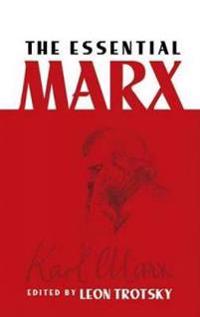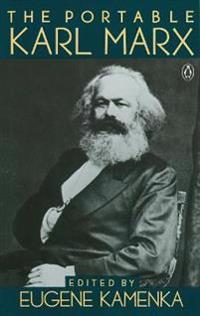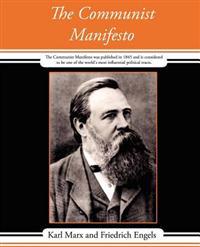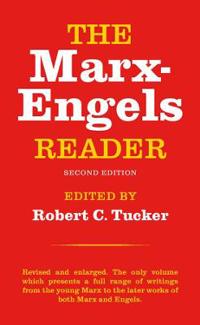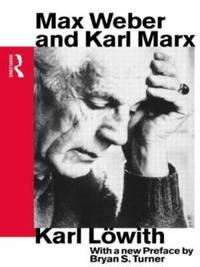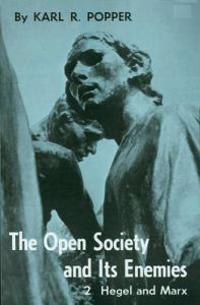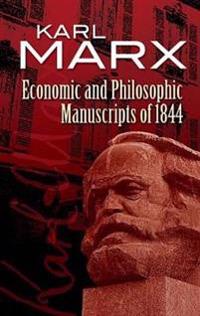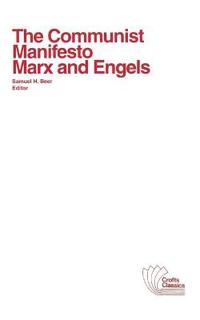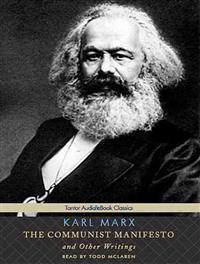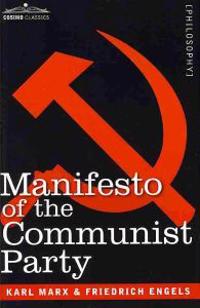Carlos Marx (Pocket)
avMarx, Karl
ISBN: 9781921438806This new Vidas Rebeldes title is a concise anthology of the key writings of Karl Marx on philosophy, history, and economics, offering a fresh perspective beyond the dogmatism in which Marxism has been buried by his supporters and foes alike, releasing Marx from his long imprisonment as a stone idol.[...]
The Essential Marx (Pocket)
avKarl Marx, Leon Trotsky, Karl Marx
ISBN: 9780486451169 - UTGIVEN: 200607The Portable Karl Marx (Storpocket)
avKarl Marx
ISBN: 9780140150964 - UTGIVEN: 198302This book is an outstanding overview of the life and thoughts of Karl Marx. The editor masterfully weaves together Marx's published works and private letters into a rich tapestry of history and ideas. In addition to what you might expect to find in a collection like this (the text of "The Communist [...]
Karl Marx (Pocket)
avKarl Marx
ISBN: 9780198782650 - UTGIVEN: 2000-06-22Providing a selection of Marx's writings, this book includes extracts from the whole range of Marx's most important pieces. It also includes a bibliography and editorial commentary on each document and provides the background and context of Marx's writing in each period. It is for those wishing for [...]
The Communist Manifesto (Häftad)
avKarl Marx, Karl Marx and Friedrich Engels
ISBN: 9781604248586 - UTGIVEN: 2007-01Kapitalen af Karl Marx (Pocket)
avKarl Marx
ISBN: 9788770533256 - UTGIVEN: 2009Tegneserie, hvor Marx' problemstillinger anskueliggøres via nogle få personer, som repræsenterer aktørerne i det kapitalistiske system: arbejderen, fabriksejeren, investoren[...]
The Marx-Engels Reader (Pocket)
avKarl Marx, Friedrich Engels, Robert C. Tucker
ISBN: 9780393090406 - UTGIVEN: 197802Compiles the significant writings of Marx and Engels in an attempt to trace the origins and meaning of classical Marxism[...]
Marx's Concept of Man (Pocket)
avErich Fromm, Karl (TRN) Marx, Erich Fromm
ISBN: 9781472513953 - UTGIVEN: 2013-12In publishing Marx's Concept of Man in 1961, Erich Fromm presented to the English-speaking world for the first time Karl Marx's then recently discovered Economic and Philosophical Manuscripts. Including the Manuscripts and many other philosophical writings by Marx as well as Fromm's own extended res[...]
Marx's Political Writings (Pocket)
avKarl Marx, David Fernbach, Tariq Ali
ISBN: 9781844676095 - UTGIVEN: 201010Karl Marx was not only the great theorist of capitalism, he was also a superb journalist, politician and historian. In these brand-new editions of Marx s Political Writings we are able to see the depth and range of his mature work from 1848 through to the end of his life, from The Communist Manifest[...]
Fronesis 28 Marx ekonomikritik (Tidskrift)
avKarl Marx, Daniel Ankarloo, Michael Heinrich
ISBN: 9789197691833 - UTGIVEN: 200808Under 1970-talet fanns en levande svensk utgivning av böcker som anknöt till Karl Marx huvudverk »Kapitalet«. Ett kvartssekel senare ser situationen annorlunda ut, trots att nyläsningarna av Marx fått ett ordentligt uppsving internationellt. I Fronesis nr 28 riktas uppmärksamheten mot Marx ek[...]
Max Weber and Karl Marx (Häftad)
avKarl Lowith
ISBN: 9780415093811 - UTGIVEN: 199309Karl Lowith was the son of a Munich artist and studied philosophy and biology in Munich, Freiburg and Marburg. He began his teaching career in 1928 as Privatdozent in Marburg, working under Heidegger, but was forced to leave in 1934. After two years in Rome he held a chair at Tohku University, Sen[...]
Beyond Marx (Pocket)
avKarl Heinz (EDT) Roth, Marcel (EDT) Van Der Linden, Karl Heinz (EDT) Roth
ISBN: 9781608464104 - UTGIVEN: 2015-03Capitalism has proven much more resilient than Marx anticipated, and the working class has hardly lived up to his hopes. What might a critique of the political economy of labour look like that critically reviews Capitalism's entire history while moving beyond Eurocentrism? In this volume twenty-two [...]
The Communist Manifesto (Häftad)
avEngels, Friedrich, Marx, Karl
ISBN: 9780671678814The most influential call-to-arms ever written, with a characteristically elegant and acute introduction by the distinguished historian Eric Hobsbawm, asserting the pertinence of the Manifesto today.[...]
Open Society and Its Enemies. Volume 2: The High Tide of Prophecy: Hegel, Marx, and the Aftermath (Häftad)
avKarl Popper
ISBN: 9780691019727 - UTGIVEN: 197102Popper was born in 1902 to a Viennese family of Jewish origin. He taught in Austria until 1937, when he emigrated to New Zealand in anticipation of the Nazi annexation of Austria the following year, and he settled in England in 1949. Before the annexation, Popper had written mainly about the philoso[...]
Capital: A Critique of Political Economy - Vol. I-Part I: The Process of Capitalist Production (Inbunden)
avMarx, Karl
ISBN: 9781605200118First published in 1867, Capital, or Das Kapital, is the infamous treatise on economics and capitalism by Prussian revolutionary KARL MARX (1818-1883), who changed history with his 1848 book The Communist Manifesto. In this work, edited by Marx's friend, German philosopher FRIEDRICH ENGELS (1820-189[...]
Kapitalet : tredje boken : den politiska ekonomins totalprocess : kritik av (Häftad)
avMarx, Karl
ISBN: 9789150400540 - UTGIVEN: 1978-01-013. Den politiska ekonomins totalprocess.
The Communist Manifesto (Pocket)
avKarl Marx, Frederic L. (EDT) Bender, Karl Marx
ISBN: 9780393935608 - UTGIVEN: 2012-08Karl Marx's 1848 text is reframed in this revised Norton Critical Edition in the context of twenty-first-century theoretical debates, capitalist globalisation, the information technology revolution and contemporary struggles up to, and including, the 2011 "Arab Spring". Simultaneously extolled in it[...]
Economic and Philosophic Manuscripts of 1844 (Pocket)
avKarl Marx, Martin Milligan, Karl Marx
ISBN: 9780486455617 - UTGIVEN: 200704Communist Manifesto (Pocket)
avKarl Marx, Friedrich Engels, Karl Marx
ISBN: 9780882950556 - UTGIVEN: 1955-06Edited by Samuel H. Beer, with key selections from Capital and The Eighteenth Brumaire of Louis Bonaparte, this volume features an especially helpful introduction that serves as a guide to Marxist political and economic theory and to placing the specific writings in their contemporary setting. Inclu[...]
The Communist Manifesto and Other Writings (CD-bok)
avKarl Marx, Todd McLaren, Karl Marx
ISBN: 9781452601724 - UTGIVEN: 201103Manifesto of the Communist Party (Inbunden)
avKarl Marx, Friedrich Engels, Karl Marx
ISBN: 9781605207995 - UTGIVEN: 2009-11The Revolutions of 1848 (Pocket)
avKarl Marx, David (EDT) Fernbach, Karl Marx
ISBN: 9781844676033 - UTGIVEN: 2010-08Marx and Engels had sketched out the principles of scientific communism by 1846. Yet it was from his intense involvement in the abortive German Revolution of 1848 that Marx developed a depth of practical understanding he would draw on in Capital and throughout his later career. This volume includes [...]
From Hegel to Marx: Studies in the Intellectual Development of Karl Marx (Övrig)
avSidney Hook
ISBN: 9780231096652 - UTGIVEN: 1994-05-27In this classic work, originally published in 1932, Hook set out to demonstrate to the radical and conservative philosophers and activists of the 1920s and 1930s that Marx was a systematic thinker who developed a sound set of philosophical principles. His major argument is that Marx was undogmatic i[...]
Marx After Marxism: The Philosophy of Karl Marx (Övrig)
avTom Rockmore
ISBN: 9780470696187 - UTGIVEN: 2004-10-31


